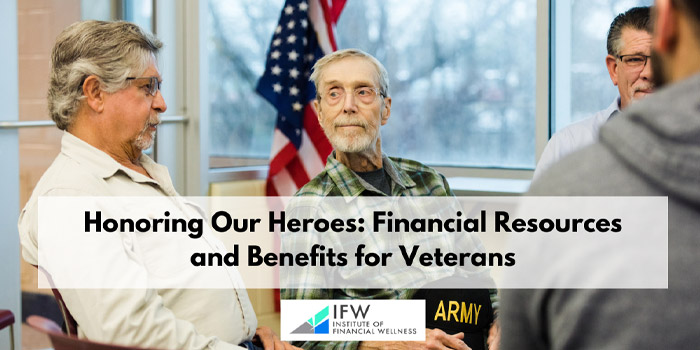Veterans face unique financial challenges as they transition to civilian life. This article provides financial resources for veterans, including educational benefits, financial assistance programs, home loans, and health care services. Discover how these resources can support you or your loved ones in achieving financial well-being.
For more financial resources, be sure to visit the Institute of Financial Wellness!
Key Takeaways
- The Department of Veterans Affairs offers comprehensive education benefits through programs like the Post-9/11 GI Bill® and the Montgomery GI Bill®, which grants academic and vocational training for veterans and their families.
- Financial assistance programs, including Chapter 115 Benefits and annuity payments, provide essential support for veterans facing financial hardships.
- The VA Home Loan Guaranty Program and specially adapted housing grants offer substantial assistance for veterans seeking homeownership.
If you’re a veteran wondering about post service work and retirement, be sure to request your retirement score with the IFW to see if you’re on track with your financial goals.
Comprehensive Education Benefits for Veterans

Education is one of the most powerful tools veterans have when stepping into civilian life, opening doors to new careers and personal growth.
The Department of Veterans Affairs offers a range of programs designed to help veterans reach their academic and career goals—and these benefits extend to their families, too.
Whether you’re a veteran yourself or a family member looking to take the next step, these programs offer support and resources to help you.
Post-9/11 GI Bill®:
The Post-9/11 GI Bill® stands out as one of the most comprehensive education benefits for veterans. It covers:
- Tuition
- Fees
- A monthly housing allowance
- A book stipend (all paid directly to the student)
Veterans with at least 90 days of active duty after September 10, 2001, may be eligible for educational benefits through the Department of Veterans Affairs (VA). These benefits can also extend to family members, allowing unused financial resources to be transferred to a spouse or dependent children.
Yellow Ribbon Program:
Veterans attending private institutions with tuition costs exceeding the Post-9/11 GI Bill® can benefit from the Yellow Ribbon Program.
This initiative offers additional financial aid, enabling veterans to attend top-tier private colleges without excessive debt. Eligibility requires students to qualify for the maximum benefit rate under the Post-9/11 GI Bill®.
Institutions like Yale College offer significant support through this program, ensuring veterans receive a deserving education.
Montgomery GI Bill®:
The Montgomery GI Bill® offers another valuable option for veterans seeking educational benefits.
By contributing a portion of their pay while on active duty, service members gain access to funding for a variety of educational paths, from college degrees to vocational training.
Vocational Rehabilitation and Employment Program:
The Vocational Rehabilitation and Employment (VR&E) Program caters to veterans with service-connected disabilities, offering education and job training services tailored to individual needs.
Focusing on both educational and vocational training, the VR&E Program ensures veterans with disabilities receive the support they need to build fulfilling careers.
Financial Assistance Programs for Veterans

Are you a veteran navigating the transition to civilian life and seeking financial stability? You’re not alone—and there’s help available.
Financial stability is essential for veterans transitioning to civilian life. Various financial assistance programs, provided by the Department of Veterans Affairs and other organizations, offer financial grants and support in times of need, acting as a safety net for veterans facing financial hardships.
These programs range from emergency assistance to long-term financial support, ensuring veterans and their families can maintain financial stability.
Learn more about how you can secure a financially stable retirement.
Chapter 115 Benefits:
Chapter 115 Benefits offer essential financial support to eligible veterans and their dependents, covering daily living expenses, medical costs, and housing.
Eligibility is determined by financial thresholds related to income and dependent status. Veterans will not lose access to their benefits if their income exceeds the threshold due to cost-of-living adjustments within the same year.
Annuity Payments:
Annuity payments provide financial assistance to disabled veterans and their families. Under the HERO Act, these payments will increase from $2,000 to $2,500 starting in August 2025. Veterans will receive their first increased payment in February 2025, followed by annual payments.
Property Tax Exemptions:
Veterans can also be granted property tax exemptions. Eligibility depends on individual circumstances and municipal legislative actions.
Veterans should consult local officials to determine the specifics of property tax exemptions in their area.
Veterans Bonuses:
Veterans who served in specific military campaigns may be eligible for bonuses recognizing their service. These bonuses act as both a token of appreciation and financial support, helping veterans stabilize their finances and honoring their contributions to national security.
VA Home Loans and Housing Support

Dreaming of owning a home? For veterans, that dream is within reach—and the VA is here to make it happen.
The VA offers support to help veterans achieve this goal. The Department of Veterans Affairs provides various housing assistance programs to support veterans, service members, and eligible spouses in securing housing.
VA Home Loan Guaranty Program:
The VA Home Loan Guaranty Program is a resource for veterans seeking homeownership. By backing a portion of the loan, the VA reduces the risk for lenders, enabling veterans to secure better interest rates and loan terms.
This program offers other advantages, including no down payment and competitive interest rates, making homeownership more accessible for veterans.
Specially Adapted Housing Grants:
For veterans with service-connected disabilities, Specially Adapted Housing (SAH) Grants provide essential support. These grants help in purchasing or adapting homes to meet the specific needs of veterans with disabilities.
In FY 2024, eligible veterans can receive up to $117,014 for home modifications, ensuring their living environments are safe and accommodating (1).
Health Care and Mental Health Services

Access to quality health care is a fundamental right for veterans. The Department of Veterans Affairs offers a range of health services to ensure veterans receive necessary medical care. From routine medical care to specialized mental health services, the VA provides support to address the health needs of veterans and their families.
VA Health Care Benefits:
VA health care benefits are available to veterans meeting specific eligibility criteria. Active military members may qualify if they haven’t received a dishonorable discharge, and those who served after September 7, 1980, need to have completed 24 continuous months of service or the full period of their active duty (2).
Mental Health Care Services:
Mental health care is a critical component of veterans’ overall well-being. The VA offers various outpatient behavioral health services to address conditions like PTSD, depression, and anxiety. These services are accessible to veterans regardless of their VA health enrollment status.
The Veterans Crisis Line provides 24/7 confidential assistance, offering immediate support in times of crisis.
Counseling and Career Support

From financial counseling to career training programs, veterans have access to resources that can significantly improve their financial well being and career prospects.
These services empower veterans with the knowledge and tools they need to succeed in civilian life.
VA Financial Counseling:
The VA offers financial counseling services to assist veterans in managing their finances effectively. These services include tools for budgeting, saving, and debt management, helping veterans make informed financial decisions.
Career Counseling and Training Programs:
The VA’s Veteran Readiness and Employment (VR&E) Service offers vocational counseling to help veterans determine their educational paths and career options. These services are available to both active-duty service members and veterans, providing personalized career planning and educational guidance.
By utilizing these resources, veterans can successfully transition into civilian employment and build fulfilling careers.
Additional Financial Resources for Families of Veterans

Behind every veteran is a family that stands strong—and they deserve financial support too.
Families of veterans play a vital role, yet they often face unique financial challenges. Thankfully, there are programs designed specifically to help these families manage their finances, offering targeted assistance to ensure they stay secure and supported.
Survivor Benefits:
Survivor benefits provide essential financial support to the families of a deceased veteran. Surviving spouses and dependent children may qualify for financial aid to help cover living and educational expenses.
The Survivor Benefit Plan allows eligible beneficiaries to receive up to 55% of a service member’s retirement pay after their death.
Educational Assistance for Family Members:
Educational assistance programs are also available for the spouses and children of veterans, ensuring they have access to quality education. These benefits can significantly reduce the cost of higher education, providing monthly stipends for schooling or training.
Programs like the Dependents’ Educational Assistance (DEA) cover various training and educational paths, making it easier for family members and eligible dependents to pursue their academic and vocational goals.
Eligible spouses can receive DEA benefits for up to 10 years after the qualifying event, with extensions possible under certain circumstances.
Time-Sensitive Benefits for Separating Service Members

As service members prepare to transition to civilian life, there are some time-sensitive benefits available to them.
Being proactive about these benefits can ensure a smoother transition back to civilian life.
Disability Claims and Insurance Options:
Filing a service connected disability claim before separation can expedite the benefits process. The Benefits Delivery at Discharge (BDD) program allows service members to submit their claims 180 to 90 days before separation, ensuring timely access to benefits.
Additionally, converting Servicemembers’ Group Life Insurance (SGLI) to Veterans’ Group Life Insurance (VGLI) or other coverage must be initiated within 120 days post-separation to avoid gaps in coverage.
Career Transition and VR&E Services:
Career transition services are needed for military personnel retiring from active duty and those in active service. Educational and career counseling services are available to help them adapt to civilian life, providing guidance on educational paths and career options.
Veterans Readiness and Employment (VR&E) services applications can be submitted up to 12 years following separation or the first VA disability rating, offering long-term support for transitioning veterans.
Finding Local Benefits:
Locating local benefits and services is also useful for veterans seeking tailored support. State offices or departments of veterans’ services can provide detailed information about the benefits available in their state of residence.
Veterans are encouraged to visit their state’s dedicated veterans’ services offices to find the specific support they need.
Summary

The various financial resources and benefits available to veterans and their families is extensive and designed to provide extensive support.
From educational benefits like the Post-9/11 GI Bill® and Yellow Ribbon Program to financial assistance programs such as Chapter 115 and annuity payments, these resources are crafted to honor the sacrifices made by our service members.
Families of veterans also receive support through survivor benefits and educational assistance, ensuring their stability and future success.
By taking advantage of these resources, veterans and their families can build a secure and prosperous future, honoring the legacy of their service.
Frequently Asked Questions
What are the eligibility criteria for the Post-9/11 GI Bill®?
To be eligible for the Post-9/11 GI Bill®, veterans must have completed at least 90 days of active duty service after September 10, 2001. This ensures that those who served honorably during this period have access to educational benefits.
How can veterans access property tax exemptions?
Veterans can access property tax exemptions by consulting local officials to understand the specific exemptions available in their area. This resource will guide them through the necessary steps to secure these benefits.
What is the Survivor Benefit Plan?
The Survivor Benefit Plan permits eligible beneficiaries to receive up to 55% of a service member’s retirement pay following their death. This ensures financial support for loved ones left behind.
How can service members file a disability claim before separation?
Service members can file a pre-discharge disability claim by utilizing the Benefits Delivery at Discharge program within 180 to 90 days prior to their separation. This ensures a smoother transition and timely access to benefits.
Where can veterans find information about local benefits?
Veterans should consult their state’s dedicated veterans’ services offices to access specific information and support regarding local benefits.




